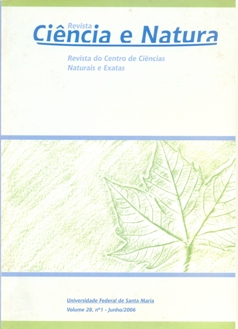Densidade de Tricomas Glandulares e Produção de Óleo Essencial em Mentha arvensis l., Mentha x Piperita l. E mentha cf. Aquatica l.
DOI:
https://doi.org/10.5902/2179460X9699Resumo
O gênero Mentha possui importância econômica como fonte deóleos essenciais para a indústria alimentícia, cosmética e farmacêutica.Os principais constituintes do óleo essencial destas espécies são terpenoscuja biossíntese está localizada nos tricomas glandulares peltados dasfolhas. Neste trabalho, determinou-se o rendimento e a composição doóleo essencial, correlacionados com a densidade de tricomas glandularesem ambas as faces (abaxial e adaxial) e em três regiões (proximal, medianae distal) das folhas nas espécies Mentha cf. aquatica L. , Mentha xpiperita L. e Mentha arvensis L. . O experimento foi conduzido no Centrode Estações Experimentais do Canguiri (UFPR) com plantas propagadaspor estaquia. A contagem de tricomas foi realizada por meio demicroscopia óptica em folhas expandidas do sexto nó e a extração deóleo essencial por hidrodestilação. A maior densidade de tricomas foiobservada nas regiões mediana e proximal da face abaxial de Mentha arvensise distal adaxial de Mentha x piperita. Em Mentha cf. aquatica a maiordensidade foi observada na região distal da face abaxial . Outros fatores,como perdas por volatilização e/ou catabolismo, parecem ser maisdeterminantes no acúmulo de óleo essencial que a densidade de tricomas,pois o maior rendimento de óleo essencial foi observado em Mentha xpiperita (32,09 µL. g-1 de MS da folha) e Mentha cf. aquatica (33,23 µL. g-1 de MS da folha), comparado com Mentha arvensis (16,61 µL. g-1 de MS da folha). Os constituintes linalol e acetato de linalila foram predominantesnas espécies M. aquatica e M. x piperita e a-terpineol em M.arvensis. Os resultados obtidos indicam para a possibilidade de explora-ção destes materiais genéticos para a obtenção destes constituintes comaplicação na indústria cosmética, e alimentícia.Downloads
Downloads
Publicado
Como Citar
Edição
Seção
Licença
Para acessar a DECLARAÇÃO DE ORIGINALIDADE E EXCLUSIVIDADE E CESSÃO DE DIREITOS AUTORAIS clique aqui.
Diretrizes Éticas para Publicação de Revistas
A revista Ciência e Natura está empenhada em garantir a ética na publicação e na qualidade dos artigos.
A conformidade com padrões de comportamento ético é, portanto, esperada de todas as partes envolvidas: Autores, Editores e Revisores.
Em particular,
Autores: Os Autores devem apresentar uma discussão objetiva sobre a importância do trabalho de pesquisa, bem como detalhes e referências suficientes para permitir que outros reproduzam as experiências. Declarações fraudulentas ou intencionalmente incorretas constituem comportamento antiético e são inaceitáveis. Artigos de Revisão também devem ser objetivos, abrangentes e relatos precisos do estado da arte. Os Autores devem assegurar que seu trabalho é uma obra totalmente original, e se o trabalho e / ou palavras de outros têm sido utilizadas, isso tem sido devidamente reconhecido. O plágio em todas as suas formas constitui um comportamento publicitário não ético e é inaceitável. Submeter o mesmo manuscrito a mais de um jornal simultaneamente constitui um comportamento publicitário não ético e é inaceitável. Os Autores não devem submeter artigos que descrevam essencialmente a mesma pesquisa a mais de uma revista. O Autor correspondente deve garantir que haja um consenso total de todos os Co-autores na aprovação da versão final do artigo e sua submissão para publicação.
Editores: Os Editores devem avaliar manuscritos exclusivamente com base no seu mérito acadêmico. Um Editor não deve usar informações não publicadas na própria pesquisa do Editor sem o consentimento expresso por escrito do Autor. Os Editores devem tomar medidas de resposta razoável quando tiverem sido apresentadas queixas éticas relativas a um manuscrito submetido ou publicado.
Revisores: Todos os manuscritos recebidos para revisão devem ser tratados como documentos confidenciais. As informações ou ideias privilegiadas obtidas através da análise por pares devem ser mantidas confidenciais e não utilizadas para vantagens pessoais. As revisões devem ser conduzidas objetivamente e as observações devem ser formuladas claramente com argumentos de apoio, de modo que os Autores possam usá-los para melhorar o artigo. Qualquer Revisor selecionado que se sinta desqualificado para rever a pesquisa relatada em um manuscrito ou sabe que sua rápida revisão será impossível deve notificar o Editor e desculpar-se do processo de revisão. Os Revisores não devem considerar manuscritos nos quais tenham conflitos de interesse resultantes de relacionamentos ou conexões competitivas, colaborativas ou outras conexões com qualquer dos autores, empresas ou instituições conectadas aos documentos.






